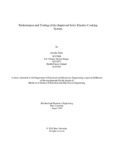| dc.contributor.advisor | Azad, A.K.M. Abdul Malek | |
| dc.contributor.author | Akter, Ayesha | |
| dc.contributor.author | Haque, Md. Minhaz Masrur | |
| dc.contributor.author | Ahmed, Sheikh Faiyaz | |
| dc.date.accessioned | 2020-01-21T10:04:04Z | |
| dc.date.available | 2020-01-21T10:04:04Z | |
| dc.date.copyright | 2019 | |
| dc.date.issued | 2019-08 | |
| dc.identifier.other | ID 14321004 | |
| dc.identifier.other | ID 14321037 | |
| dc.identifier.other | ID 14321008 | |
| dc.identifier.uri | http://hdl.handle.net/10361/13654 | |
| dc.description | This thesis is submitted in partial fulfillment of the requirements for the degree of Bachelor of Science in Electrical and Electronic Engineering, 2019. | en_US |
| dc.description | Cataloged from PDF version of thesis. | |
| dc.description | Includes bibliographical references (pages 64-67). | |
| dc.description.abstract | Different types of solar cooking systems have been used from past few years. From parabolic
system to panel cookers. Each and every cooking method came up with individual and unique
concepts. Several attempts are made to introduce these solar cookers and have achieved
variable success. There are still some critical issues need to be solved for wider dissemination
of this technology. They include affordable cost, materials to be used, appropriate location for
using solar cooker, size, design and cooking time. Following these points, an improved version
of solar electric stove has been designed. As it is called an improved version, this stove is
structured over verification of double burner stove named “Development of Double Burner
Electric Stove Powered by PV Solar Panel.” In this improved version we have brought out some
significant changes involving size, material, cost, cooking time and design. Here we have
presented a comprehensive study over performance based and test analysis between both stoves
comparing theoretically, experimentally, and development works. We have also evaluated with
previously conducted solar cookers to show how the improved one is more efficient. As it is a
green approach, we intend to grab attention towards the clean energy system and how they are
comfortable to use. Since 90% of people use biomass, jute, cow-dung or wood for cooking.
This causes harmful effects to health and only 6% of the people have the accessibility to natural
gas, primarily in urban areas. Also supply of electricity is not stable and base demand cannot
be met. In fact, new gas connection to household has been suspended and electricity can be
used only by prepaid system. Thus most people use cylinder gas or electric stove for cooking.
Following these issues, our goal is to give sufficient amount of energy which is cost efficient,
available, environment friendly and healthy. | en_US |
| dc.description.statementofresponsibility | Ayesha Akter | |
| dc.description.statementofresponsibility | Md. Minhaz Masrur Haque | |
| dc.description.statementofresponsibility | Sheikh Faiyaz Ahmed | |
| dc.format.extent | 67 pages | |
| dc.language.iso | en | en_US |
| dc.publisher | Brac University | en_US |
| dc.rights | Brac University theses are protected by copyright. They may be viewed from this source for any purpose, but reproduction or distribution in any format is prohibited without written permission. | |
| dc.subject | Cooking system | en_US |
| dc.subject | Solar energy | en_US |
| dc.subject | Deep bowl | en_US |
| dc.subject | Battery backup | en_US |
| dc.subject | Eco-friendly | en_US |
| dc.subject | Cost efficient | en_US |
| dc.subject.lcsh | Renewable energy sources. | |
| dc.title | Performance and testing of the improved solar electric cooking system | en_US |
| dc.type | Thesis | en_US |
| dc.contributor.department | Department of Electrical and Electronic Engineering, Brac University | |
| dc.description.degree | B. Electrical and Electronic Engineering | |

